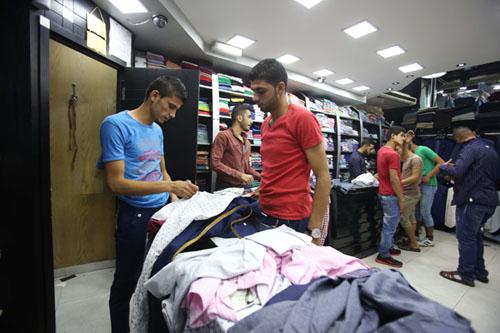You are here
Commercial sector walking a tightrope on 'disappointing' gov’t policies — Murad
By Omar Obeidat - Jan 04,2015 - Last updated at Jan 04,2015

AMMAN – The commercial sector expects 2015 to be a challenging year due to "disappointing" government policies.
At a press conference on Sunday, Amman Chamber of Commerce (ACC) President Isa Murad and board members said the government decision to increase electricity prices as of January 1 and the new income tax law would not only cause slowdown in demand for goods this year but also would reduce tax revenues from the sector.
Murad listed a number of issues which he said would hurt the performance of economic and commercial activity this year.
The biggest concern for traders, according to Murad, was raising income tax rate on commercial and service companies from 14 per cent to 20 per cent.
This could force many investors to leave the Kingdom to other regional markets, he said, warning that raising taxes could also encourage tax evasion.
Murad added that the commercial sector is the largest employer of Jordanians as it employs over 380,000 workers, representing 38.5 per cent of the overall labour force in the Kingdom.
Noting that the sector is also the biggest source of tax revenues to the treasury, he indicated that commercial activities generated around JD1.9 billion in sales tax in 2013, around 76 per cent of the sales tax revenues.
The ACC president described the 15 per cent increase in electricity tariffs, which went into effect on Thursday, as a challenge for the sector.
Over five years, Murad said electricity prices went up by 92 per cent, warning that the recent increase would reduce demand for goods as the rise in operational costs of merchants would automatically be reflected on consumers who, according to him, suffer from fading purchasing power due to rising living costs while their incomes remain fixed.
The ACC chief called on the government to reconsider its decision regarding power tariffs as global oil prices have been going down sharply.
"Instead of raising electricity tariffs, the government should solve the issue of waste in electricity that costs over JD300 million a year," he said, adding that the five-year government plan to end the losses of the state-owned National Electric Power Company by 2017 should be revised in light of the decline in oil prices.
ACC Vice Chairman Ghassan Kherfan said a number of companies have left the Jordanian market and settled in other regional countries, which he said are more competitive in terms of taxes and energy costs.
"Many IT, real estate and construction firms left Jordan when the income tax rate was 14 per cent. With the new rate of 20 per cent, we are afraid that many others would leave, "Kherfan noted.
Related Articles
Amman Chamber of Commerce (ACC) President Issa Murad on Wednesday called on the government and lawmakers not to increase taxes on the commercial sector.
AMMAN — Amman Chamber of Commerce (ACC) President Issa Murad on Monday praised a Cabinet decision that lowers sales tax and customs duties o
Food prices are expected to go up this year by nearly 20 per cent, according to a leading sector representative, who also said that demand for commodities is projected to slow down.













